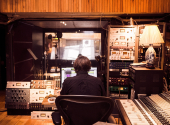
5 Things That Can Baffle an Adult Beginner Musician
You have made a major life decision – you're finally going to make your dream come true and learn to play a musical instrument. You may even be already brushing off the first specks of dust from the brand-new toy that forms the centrepiece of the altar of your musical aspirations. But alas, now comes the hard part – climbing the first slopes of musical apprenticeship by taking music lessons and learning to play. And this is where your mental and physical self gets a bit of a workout. Let's take a look at five annoyances (let's call them challenges to be more constructive) that every adult beginner musician must overcome if they want to successfully progress towards their dream.
1. Step by step
You come to your first lesson with your new instrument. You settle into the model position you've practised from YouTube tutorials, with an expression of eager curiosity on your face. You don't care about theoretical introductions, you want to start playing right away, ideally leaving at the end of the first lesson with your favourite riff in your pocket, your hands and your memory.
But as the lesson progresses, you start to realise that it will take a while to get to that point. Unless you're an adult prodigy, you need to lower your expectations, swallow your ego, master the craft and learn healthy physiological habits, the laws of music theory and the practice routine. This should all be done step by step, with respect for your body and mind.
It is up to the teacher's intuition, erudition and experience, as well as your mutual agreement, how much you want to handle and how much you can handle in one hour. Excessive effort to "get the most out of every second of the lesson" is just as detrimental to your development as the opposite, lax approach of "I paid for an hour of relaxation and chat", meaning you don't even look at the instrument except when meeting the teacher.
A good teacher does not overwhelm you with information. Rather, you leave each lesson with the motivating feeling that you have learned something new, even if it seems to be only a few basic things and details. Even the basics such as sitting correctly, holding the instrument properly, being able to tune it and two or three technical exercises to start with are worthwhile. Persevere and remember that if you have a good teacher who doesn't teach you bad habits, sooner or later you will reach your goal.
2. And why and why and why?
Do you know what philosophy, three-year-olds and the Backstreet Boys have in common? The "tell me why" question. The trap for the adult ego in music lessons is, among other things, the desire to learn "everything" in music theory right away: "Five lines, seven letters of the alphabet and counting to four – I can pick that up in ten minutes, can't I? Wait, but why is there a semitone in the major scale between 3rd and 4th and 7th and 8th? And how big is that semitone exactly? Why do we have sharps and flats when each note in the stave could just have its own place and its own letter? And why isn't there a separate three-quarter note? And why and why and why and why...?"
A lot of music theory is historically determined, and even though the whole system is by no means perfect, if we want to get along with other musicians, we have no choice but to "play the cards we are dealt". It's similar to linguistic systems – theoretical categories emerged to describe, correct and influence the already existing practice. Just as the graphic form of musical notation was influenced by writing with a quill (that funny "shading" of notes, clefs and other symbols), the division of the octave into twelve equally spaced parts (semitones) and the determination of pitch and naming of individual notes is affected by historically changing knowledge of the laws of physics from ancient Greece to the Christian modern era.
Asking for an explanation of a phenomenon often leads you into a vicious circle where you need to understand several other concepts at the same time. And unless you want to get really deep into a historical lecture on music theory or into the mysteries of physics, it's not a bad idea to accept some music theory laws as bare facts, at least at the beginning, and not to endlessly wonder "why". The individual phenomena and the relevant concepts are best mastered by practice and experience.
3. The wear and tear of body and mind
All right, let's leave the theory and get back to playing. So you crack your knuckles stiff from typing on the keyboard, twist the wrists affected by carpal tunnel syndrome and the forearms sore from "mouse disease" (by the way, there is a vertical mouse, which keeps your forearm in a more physiologically natural position) and the playing can begin. But it feels somewhat difficult – your hardware contradicts your mind's instructions, your brain software doesn't have time to process the information from the teacher, and after a few futile attempts you feel like a complete idiot.
Pause, stop and take an imaginary step back in your head. Setting difficult goals is heroic, but too much stress is counterproductive. And unfortunately, our adult bodies are already somewhat stiff and wooden. Discuss this with your teacher and regulate your workload and information flow as you need. And don't try to tackle everything right away and master the assigned exercise perfectly. Some motor habits may take a few weeks to settle down (two and a half weeks of which, even with daily practice, you can't do it at all, and then suddenly boom – dramatic improvement).
4. Experience as a drag
The less muscle and brain flexibility we have as adults, the more experience we have gained (and possibly also the ability to learn from it). We don't rush into things as casually and spontaneously as children. But while the survival instinct is a good servant when it comes to not touching a hot stove, it is a bad master when it stops us from pushing our own limits, trying new things and embarking on musical adventures. Some experiences (or mere misconceptions) simply hold us back, and that's a shame.
If you have boldly booked your music lessons and arrived at the class, keep the brave spirit and enthusiasm and do not create unnecessary obstacles for yourself such as fear of failure and self-doubt in case your progress is not as fast as you expected. Also, forget about childhood traumas, if any adults used to judge you for not being able to sing or play. The best thing is to have your own opinion about yourself and not let it be taken away from you – like one little boy at the admissions at a music school, who, after having played the beginning of "Twinkle, Twinkle Little Star" on the piano, was asked whether he would like to learn to play another instrument. And he said, "No. I can only play the piano."
5. No time to practice
And finally, one of the pitfalls, which usually only dawns on you when you have to go to the second lesson a week later: "Damn, I haven't even touched it all week!" How is that possible? After all, learning to play has been your dream for years. Before you start berating yourselves for being slackers and hypocrites, you should remember that being disciplined enough to find a regular time to practice is not an innate trait in most mortals. Even most successful child prodigies have, for at least the first few years, a guardian angel in the form of a parent who selflessly practices with them.
For some, it helps to create a regular daily routine and practice for just five minutes a day, while others prefer the all-or-nothing approach and practice less frequently but more intensively. Either way, if you're the kind of person who enjoys results rather than the process, you don't have to give up playing. You'll just have to figure out what works for you – it could be gigging with a band or playing at a jam session, which will motivate you to practice out of fear of possible embarrassment. Or maybe very expensive music lessons, where the lack of preparation will hurt you financially. Try anything – fortunately, with music, the appetite comes with eating.
If you have found an error or typo in the article, please let us know by e-mail info@insounder.org.





